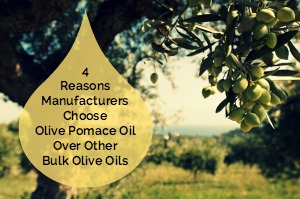 Why do manufacturers choose the grade of olive oil that they do? This is a good question, especially if you're a growing brand or manufacturer in the process of deciding what grade is right for your product.
Why do manufacturers choose the grade of olive oil that they do? This is a good question, especially if you're a growing brand or manufacturer in the process of deciding what grade is right for your product.
Today we're going to look at a debated topic: Why would a manufacturer choose the lowest grade of olive oil, Olive Pomace Oil, over other bulk oil grades available?
There's actually a number of reasons-- and they're not all price. Let's review 4 reasons why manufacturers in the industry (potentially even your competitors) would ever choose olive pomace oil for an ingredient.
First though, let's define Olive Pomace Oil, so that everyone is on the same page.
What Is Olive Pomace Oil?
Olive Pomace Oil is oil that is extracted from the pomace of the olive. “Pomace” is pulp made from the olive pit and already-squeezed olive fruit.
How Is Olive Pomace Oil Made?
When an olive is picked, it is ground into a paste which is squeezed (expeller pressed) or spun to get the initial oil out. The dry pulp left over is called the pomace. With Olive Pomace Oil, a solvent (typically hexane) is added to the pomace to extract any remaining oil. The solvent is removed, and the remaining Pomace Oil is refined.
The final result is Olive Pomace Oil, the lowest grade of oil made from an olive. It is light in color and mild in taste.
This extraction process is similar to the way that any seed oil is produced; conventional Canola Oil, Soybean Oil (known as vegetable oil on retail shelves) and other seed oils are extracted in just the same way.
Now, with that definition under our belt, let's review 4 reasons why manufacturers would really want to use that type of oil.
3 Reasons Manufacturers Choose To Use Olive Pomace Oil As A Bulk Ingredient
1. It has the lowest price.
Price is not the only thing, but it is a big factor. If you want to price your end product at a particular point, the bottom line is that your ingredients have to cost less than that, and you still need to mantain your profit.
Therefore, you're probably looking for ingredients that fit within a particular price range that you know is going to work for you. There's a number of ways to get the price of your ingredients down without changing the quality of your oil. However, if those things aren't cutting the cost of your ingredients enough, you may have to look at getting a lower grade or a blend of oils.
To give you a picture of the differences between the prices of each grade, check out these two articles:
- Comparing Olive Oil Grades Across The Quality/Price Spectrum
- What Is The Price Of Olive Oil in Bulk?
2. It has a light taste profile.
Olive Pomace Oil is a refined oil. This means that it goes through a high heat refining and filtering process, which removes much of the natural flavor and color. The result is a light, mild oil.
Picture the "Extra Light" Olive Oil on your retail shelf-- you know how light that oil is? That's because it's been refined, in just the same way that the Pomace Oil has.
Why is this important? Sometimes, a manufacturer may want an oil that doesn't have much color or flavor because those features negatively affect their end product. In this case, Olive Pomace Oil fits the bill.
3. It tolerates heat better.
Another result of Olive Pomace Oil being a refined oil is that it tolerates heat better than oils which are first, cold pressed. What I mean is that with Olive Pomace Oil, the smoke point is higher than say, an Extra Virgin Olive Oil.
Why is this important? If you're manufacturing a sautee, popping popcorn, or producing anything in high heat, Extra Virgin Olive Oil can smoke (because it simply is not made to tolerate heat) and impart a bad flavor into your product. You need to choose a bulk olive oil that will stand up to the cooking process that you use.
3. It is more consistent.
One last result of Olive Pomace Oil being a refined oil is that it is consistent. When you remove the flavor and color from the oil, the taste is no longer unique. Country to country, harvest to harvest, varietal to varietal, Olive Pomace Oil tastes pretty much the same.
If you need an extremely consistent ingredient but want to purchase from any country of origin where the price of the oil is right, it's easy to do with Olive Pomace Oil. It would be more of a challenge with Extra Virgin Olive Oil, because the taste can vary so easily.
However, there are still some variations in pomace, particularly the amount of olive sediment in the oil. So don't expect a 100% consistent product-- it's still a natural oil, subject to crop variations. Any changes are just much more slight than you'd find in the other grades.
Want an Alternative To Olive Pomace Oil?
If you want an alternative oil to Olive Pomace Oil, try Refined Olive Oil-- this is is actually Virgin Olive Oil (first press oil) which has gone through the same exact refining process. It will meet your needs on #2, 3 and 4, though it does have a higher cost than Olive Pomace Oil because of how it is extracted.
Topics: Olive Pomace Oil












